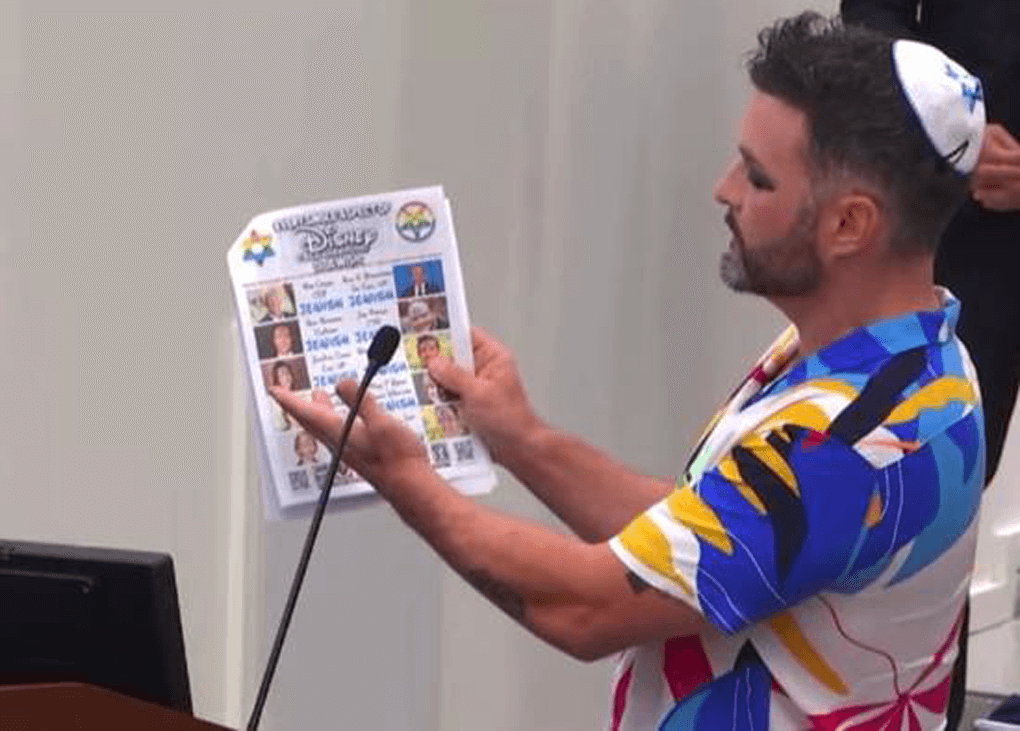Antisemites’ new tactic: Create chaos at city council meetings
An extremist group is encouraging members to disrupt government meetings. The ADL has advice on responding

Graphic by Angelie Zaslavsky
The leader of the antisemitic Goyim Defense League is encouraging followers to “find a city council meeting” to “talk about Jewish supremacy,” according to a new report from the Anti-Defamation League.
The ADL documented three dozen examples in nine states where extremists tried to hijack meetings with hate speech. In one case, the perpetrator pretended to be Jewish as part of his strategy.
Jon Minadeo, who heads the GDL, appeared on Jan. 23 at an Orlando City Council meeting wearing a yarmulke, saying he was a gay Jewish man named Tammy Cohen. “I’m Jewish,” he said. “Our people are controlling America. OK? So, I want to stop antisemitism by being honest.”
Some extremist speakers show up over and over when their local governments meet. When they are joined by supporters and then counter-protesters, the ADL said, the result is “chaos.”
That’s what happened when antisemite Ryan Messano showed up weekly at Sacramento City Council meetings to deliver antisemitic diatribes. His followers and opponents faced off, confrontations ensued, and police had to clear the room.
“Clips of extremists speaking at and calling in to local government meetings have become part of the GDL’s increasingly profitable efforts to monetize antisemitic harassment as entertainment,” the ADL wrote.
In some cases, the ADL said, extremist activity includes harassing local officials — especially those who are Jewish — outside meeting rooms. After a June 6 City Council meeting in Walnut Creek, California, the Golden State Skinheads hung antisemitic banners in a nearby town that included the name of a Jewish council member. At a meeting two weeks later, GDL member Harley Petero asked the Jewish council member: “How do you like those banners?”
Petero also called into a meeting of Sonoma, California’s board of supervisors to declare that “every single aspect” of the Sept. 11th terror attacks “was Jewish.”
At a July council meeting in Bethlehem, Pennsylvania, Arthur Curatola railed against “rich and powerful militant Jews.” And in May at a meeting in Columbus, Ohio, Brian Grossman said he was once proud that his grandfathers fought against Germany, but now believes they “fought the wrong side.”
Other examples were documented in Maryland, Michigan, Oklahoma, Texas and Washington state.
The ADL created a toolkit to help local officials and members of the public prepare for and respond to these situations. Recommended steps include:
- Make sure rules for public comments include consistent time limits for each person and require speakers to sign up in advance.
- Establish protocols for addressing violent or hateful rhetoric.
- Be prepared to denounce hate speech “in the moment without repeating it,” while “making clear that such rhetoric is unacceptable.” For example, depending on what’s said, responses to bigoted comments should label them as racist, antisemitic or homophobic, and should affirm the community’s commitment to diversity and inclusion. “Comments like those are deeply problematic and harmful, and wholly inconsistent with our community’s values,” is one way to put it.
- Communicate with the public after any incidents, including providing opportunities for impacted groups to discuss what happened.













